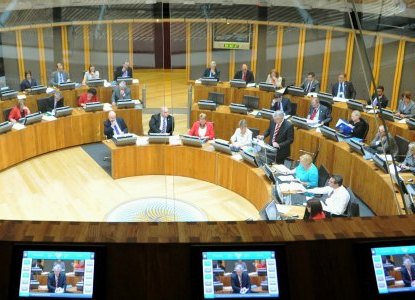Time to do democracy by the numbers
South Wales Evening Post - 5 November 2013
A lesson I learned in politics is that if a speech starts with a clever quote then it usually means something pretty dumb is about to follow.
It’s with this is mind that I refer to the opinion of Winston Churchill who once wrote, “The best argument against democracy is a five minute conversation with the average voter.”
Nevertheless, my contention this this week is that I think Wales needs more Assembly members – there, I’ve said it.
Yes, I’ve read a lot of highly critical comment in the letters page and elsewhere about the idea to increase the current total of 60 Assembly members. I’m also sceptical that many of those critics will have read the report in question.
The Electoral Reform Society, who are hardly a bunch of political lightweights, point out that only 42 of the present 60 Welsh AMs can hold the Welsh Government to account and scrutinise legislation. This compares with 113 individuals in the Scottish Parliament and 522 at Westminster.
Many AMs privately admit that they don’t always have time to read, let alone reflect properly on their committee documents ahead of meetings.
Opponents of a change maintain that there’s nothing much wrong with the Senedd and its committees that couldn’t be put right by cutting a few holidays and scrapping the family-friendly policies. I’m not convinced that it’s simply a matter of time management. Warnings about insufficient numbers go back to 2004 when the cross-party Richard Commission recommended an increase from 60 to 80 members.
Last week saw David Cameron and Nick Clegg make welcome noises about devolving income tax-varying powers to the Welsh Assembly, subject to a referendum. The response from First Minister Carwyn Jones was that no-one would be rushing to embrace the offer of additional powers until it’s clear that Wales will not end up worse off as a result.
Whatever the rhetoric involved, it’s clear that a shift towards greater financial independence is inevitable and that it will substantially change the nature of governance in Wales. Effective scrutiny of how income is raised and spent will become more vital than ever.
Like others who occasionally view Assembly proceedings from the public gallery, I’m not sure that this necessary level of oversight can be achieved without more members. Time constraints aside, there remains a nagging feeling that the institution will continue to be a little shallow in the gene pool of available talent.

Is the Senedd's pool of talent a bit shallow?
Whilst I can (just about) make the case for a larger Senedd chamber, I’m not so naïve as to ignore that by far the biggest barrier in getting more AMs and all the support paraphernalia involved is the price tag.
I could say that devolution was never going to be a cheap option – which is actually true but very likely a bit too glib in this instance. And I’m the first to admit that we already cough up enough to pay for councils, quangos and what-have-you without adding any further cost.
But isn’t that the point? We still have a Welsh Office and a Secretary of State for Wales costing just short of £13 million a year. We have over 1200 councillors in 22 unitary authorities. I’m not saying that cutting these would automatically put more money into Assembly coffers but it might result in Wales becoming less expensively over-governed
There are already plans in this direction but I have some misgivings. Mostly because politicians have the ability to confuse reorganisation and reform in the same way that some of them can’t tell the difference between deficit and debt.
The dilemma is a familiar one to Steve Thomas, who is runs the Welsh Local Government Association. He expects ‘rationalisation’ to come soon enough but highlights two drawbacks. The first is how history tells us that there’s no really no such thing as a self-financing public sector reorganisation. Secondly, what’s the benefit if Cardiff Bay still insists on micro-managing everything?
I can see his last point. Councils have far more important things to be doing in my opinion than bidding for miniscule specific grants that then get overseen to death by a small army of Welsh government box-tickers. If ever there was scope for a cull and ample cost-savings then ministers really need look no further.
I have to confess however that I’m not hopeful of a breakthrough just yet.
Like me, you may have read how plans by a Powys farmer to build a mega-dairy next to a school recently received ministerial go-ahead despite the local council and a public inquiry inspector saying it should be refused. Planning minister Carl Sargeant said he felt economic benefits outweighed other considerations.
Depending on your perspective, this is either a positive move by a minister giving due priority to economic wellbeing or a worrying instance of community interests getting overridden by political expediency.
I have no view either way. But I do wonder if an reportedly hard-pressed Assembly committee system will find the time to adequately examine this decision and the policy thinking involved.